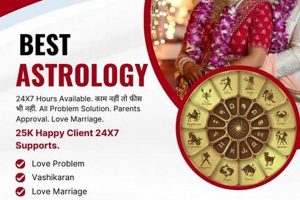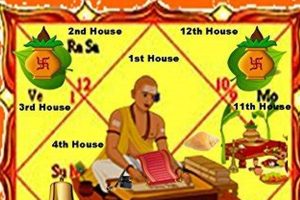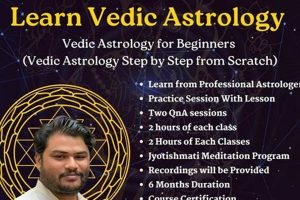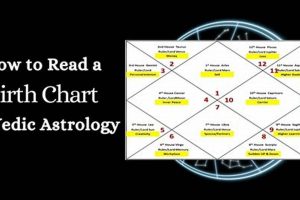Accessing the wisdom of Jyotish, or Vedic Astrology, is now widely available through digital platforms. This approach involves learning the complex system of planetary influences, constellations, and houses through online courses, webinars, and digital resources. For instance, students can engage with pre-recorded lectures, live interactive sessions, and personalized chart analysis software, all from the convenience of their homes.
This modern accessibility empowers individuals worldwide to delve into a rich astrological tradition previously limited by geographical constraints and traditional apprenticeship models. Jyotish, rooted in ancient Vedic scriptures, offers a framework for understanding life’s patterns and cycles, providing insights into personality, relationships, career paths, and life purpose. Utilizing digital platforms democratizes access to this knowledge, enabling personal growth and self-awareness for a broader audience.
Exploring the multifaceted world of Jyotish online requires navigating a landscape of various teaching styles, methodologies, and levels of expertise. The following sections will address key considerations for prospective students, including curriculum selection, instructor credentials, and the integration of technology into this ancient practice.
Embarking on the journey of learning Vedic Astrology online requires careful consideration and strategic planning. The following tips provide guidance for prospective students seeking a fulfilling and enriching educational experience.
Tip 1: Research Reputable Instructors and Institutions: Thoroughly investigate the credentials and experience of potential instructors. Look for certifications, lineage, and testimonials from previous students. Established institutions often offer structured curricula and support systems, which can be beneficial for beginners.
Tip 2: Define Learning Objectives: Clarifying personal goals, whether a basic understanding of astrological principles or advanced predictive techniques, will inform course selection and ensure alignment with individual needs.
Tip 3: Evaluate Course Content and Structure: Examine the syllabus, learning materials, and teaching methodologies. Consider whether the course offers a balanced blend of theoretical concepts and practical application, including chart analysis and interpretation.
Tip 4: Explore Technological Integration: Modern Vedic Astrology software can be a valuable tool for chart creation, calculations, and research. Assess whether the course incorporates such technology effectively to enhance learning and practice.
Tip 5: Foster a Supportive Learning Environment: Connecting with fellow students through online forums or study groups can provide valuable peer-to-peer learning and community support.
Tip 6: Cultivate Patience and Persistence: Mastering Vedic Astrology requires dedicated study and practice. Embrace the learning process with patience and persistence, recognizing that proficiency develops over time.
Tip 7: Integrate Ethical Considerations: Responsible astrological practice involves ethical considerations, including client confidentiality and the appropriate application of astrological insights. Seek guidance from experienced practitioners on ethical principles.
By adhering to these guidelines, individuals can cultivate a strong foundation for understanding and applying the principles of Vedic Astrology, leading to a more enriching and rewarding learning experience.
These preparatory steps will allow prospective students to engage with online Vedic Astrology studies effectively and responsibly, paving the way for a deeper understanding of this complex and insightful system.
1. Accessibility
Accessibility represents a transformative element within the realm of Vedic Astrology studies. Previously limited by geographical location and traditional guru-shishya parampara (teacher-student lineage), the digital age has democratized access to this ancient knowledge system. Online platforms transcend geographical boundaries, enabling individuals worldwide to engage with Vedic Astrology teachings, regardless of their proximity to physical institutions or teachers. This expanded reach fosters a global community of learners and contributes to the preservation and dissemination of this rich astrological tradition. For instance, someone in a remote village with limited access to educational resources can now learn from renowned astrologers through online courses and webinars.
This increased accessibility fosters a diverse learning environment, connecting individuals from various backgrounds and cultures who share a common interest in Vedic Astrology. Furthermore, online learning often provides flexible scheduling options, accommodating diverse lifestyles and time zones. Recorded lectures, downloadable materials, and on-demand access allow students to learn at their own pace and revisit content as needed. This asynchronous learning model caters to individuals with busy schedules or those who require more time to absorb complex concepts. The availability of online forums and discussion groups also facilitates peer-to-peer learning and community building, supplementing formal instruction with shared insights and support networks.
While accessibility broadens participation in Vedic Astrology studies, discerning learners must prioritize credible sources and qualified instructors. The open nature of the internet necessitates careful evaluation of online resources and educational programs to ensure quality and authenticity. Reputable institutions and experienced practitioners often maintain an online presence, providing verifiable credentials and testimonials. By prioritizing credible sources and fostering a discerning approach to online learning, individuals can harness the transformative power of accessibility to deepen their understanding and appreciation of Vedic Astrology.
2. Flexibility
Flexibility stands as a cornerstone of online Vedic Astrology education, contrasting sharply with the rigid schedules often associated with traditional learning environments. This adaptability caters to diverse lifestyles and learning preferences, fostering accessibility and individualized study plans. Examining the multifaceted nature of this flexibility reveals its profound impact on the online learning experience.
- Temporal Freedom
Online platforms offer asynchronous learning, liberating students from fixed class timings. Pre-recorded lectures and downloadable resources empower individuals to engage with the material at their convenience, accommodating professional commitments, family responsibilities, and personal preferences. For example, a working professional can study late at night or during lunch breaks, tailoring their learning schedule to their specific needs.
- Pacing Autonomy
Self-paced learning allows individuals to progress through the material at a speed commensurate with their comprehension and learning style. Students can dedicate extra time to challenging concepts or quickly review familiar material, fostering a deeper understanding and reducing learning anxieties. This personalized approach optimizes knowledge retention and promotes a more fulfilling educational experience.
- Geographical Independence
Online learning transcends geographical limitations, allowing students to access courses and connect with instructors from anywhere in the world. This eliminates the need for relocation or commuting, expanding access to specialized teachers and diverse perspectives within Vedic Astrology. This global reach enriches the learning environment and fosters a diverse community of learners.
- Technological Adaptation
Online platforms leverage technological advancements to enhance the learning experience. Interactive software, virtual classrooms, and online forums facilitate communication, collaboration, and personalized feedback. These tools create a dynamic and engaging learning environment, mirroring the benefits of in-person instruction while maintaining the flexibility of online access.
These facets of flexibility combine to create a learning environment uniquely suited to the complexities of Vedic Astrology. By empowering individuals to control their learning journey, online platforms foster a deeper engagement with the material and cultivate a more personalized and enriching educational experience. This adaptability is crucial for navigating the intricate concepts and practical applications of Vedic Astrology, paving the way for a more comprehensive understanding of this ancient system.
3. Credibility
Credibility serves as a crucial benchmark when navigating the diverse landscape of online Vedic Astrology education. The open nature of the internet necessitates careful evaluation of sources and instructors to ensure the authenticity and quality of the learning experience. Establishing credibility requires a multifaceted approach, encompassing factors such as lineage, qualifications, experience, and ethical conduct.
- Lineage and Traditional Background
In Vedic Astrology, lineage often signifies a connection to a respected tradition or parampara (lineage of teachers). While not essential, a demonstrable lineage can provide context and depth to an instructor’s understanding of the subject. Students may research an instructor’s guru or lineage to ascertain their connection to established schools of thought within Vedic Astrology. For instance, an instructor might trace their lineage back to a renowned astrologer, indicating a transmission of knowledge and practice through generations. However, it’s crucial to recognize that lineage alone does not guarantee competence, and students should consider other factors in conjunction with lineage.
- Qualifications and Certifications
Formal qualifications and certifications from recognized astrological institutions can indicate a commitment to professional standards and a structured approach to learning. Students can inquire about an instructor’s educational background, certifications, and affiliations with professional organizations. For example, certifications from reputable Vedic Astrology organizations demonstrate a level of proficiency and adherence to specific astrological principles. These credentials can serve as a starting point for evaluating an instructor’s expertise.
- Practical Experience and Client Testimonials
Practical experience in astrological consultation and chart interpretation is a significant indicator of an instructor’s ability to apply theoretical knowledge in real-world scenarios. Client testimonials and reviews can offer valuable insights into an instructor’s teaching style, communication skills, and ethical conduct. Students may seek out reviews and feedback from previous students to gain a better understanding of the learning experience and the instructor’s practical expertise.
- Ethical Conduct and Professionalism
Ethical considerations are paramount in the practice of Vedic Astrology. Students should seek instructors who demonstrate integrity, respect for client confidentiality, and a responsible approach to astrological interpretation. Instructors should adhere to ethical guidelines established by professional organizations, ensuring that their practice aligns with ethical principles. For example, instructors should emphasize the importance of client privacy and avoid making deterministic predictions or offering unqualified advice.
By carefully considering these facets of credibility, students can navigate the complexities of online Vedic Astrology education with greater discernment. Prioritizing credibility ensures a more enriching and trustworthy learning experience, fostering a deeper understanding of this ancient system and its practical applications. This careful evaluation ultimately empowers students to make informed decisions about their educational journey and connect with instructors who embody the highest standards of knowledge, experience, and ethical practice.
4. Resources
Access to a rich array of resources significantly impacts the effectiveness of online Vedic Astrology studies. These resources, ranging from digital libraries of ancient texts to sophisticated astrological software, provide essential tools for comprehension, analysis, and practical application. The availability and effective utilization of such resources directly correlate with the depth and breadth of learning attainable within online Vedic Astrology programs.
Several key resource categories contribute to a comprehensive online learning experience. Digital libraries offering searchable databases of classical Vedic texts, such as the Brihat Parashara Hora Shastra, provide foundational knowledge and context. Modern interpretations and commentaries by respected scholars further illuminate these complex texts, aiding comprehension. Astrological software facilitates accurate chart calculations, planetary placements, and divisional chart analysis, automating complex processes and allowing students to focus on interpretation. Ephemerides, tables listing planetary positions, are readily available online, enabling precise calculations and historical analysis. Furthermore, access to online forums and communities connects learners with peers and mentors, facilitating discussion, shared insights, and collaborative learning. For example, a student might use software to generate a birth chart, consult an online ephemeris to verify planetary positions, then refer to a digital library to research specific planetary combinations mentioned in classical texts. Finally, participating in an online forum allows them to discuss their interpretations and learn from others experiences.
The availability of these resources democratizes access to Vedic Astrology education, bypassing the limitations of physical libraries and traditional learning environments. However, the sheer volume of online information necessitates careful discernment and evaluation. Students must prioritize reputable sources, critically assess the accuracy and reliability of information, and seek guidance from qualified instructors to navigate the abundance of available resources effectively. This critical approach ensures that online resources enhance, rather than hinder, the learning process, contributing to a robust and meaningful engagement with Vedic Astrology. Ultimately, the effective utilization of online resources empowers students to develop a deeper understanding of this complex system, bridging the gap between theoretical knowledge and practical application.
5. Community
Online learning environments foster a sense of community often absent in traditional, isolated study. Within the context of Vedic Astrology, online communities provide crucial support and shared learning opportunities, enhancing the educational experience and cultivating a collaborative environment for exploring this complex subject. These digital spaces connect individuals across geographical boundaries, fostering a global network of learners united by a shared passion for Vedic Astrology.
- Peer-to-Peer Learning
Online forums and study groups facilitate interaction among students, enabling peer-to-peer learning and knowledge sharing. Students can discuss challenging concepts, share interpretations, and offer mutual support, creating a collaborative learning environment that complements formal instruction. For example, a student struggling with a specific astrological technique can pose a question in a forum and receive feedback and guidance from fellow learners who have already mastered that technique. This dynamic exchange of knowledge fosters a deeper understanding and accelerates the learning process.
- Mentor-Mentee Relationships
Online platforms can facilitate connections between experienced practitioners and aspiring astrologers, fostering mentor-mentee relationships that enrich the learning experience. Students can seek guidance from seasoned professionals, gaining valuable insights and personalized feedback on their progress. Established astrologers can share their expertise and offer practical advice, bridging the gap between theoretical knowledge and real-world application. For instance, a student can connect with an experienced astrologer through an online mentorship program, receiving personalized guidance on chart interpretation and predictive techniques.
- Collective Interpretation and Chart Analysis
Online communities offer opportunities for collective chart analysis and interpretation, allowing students to learn from diverse perspectives and refine their analytical skills. Students can present charts for group discussion, receiving feedback and alternative interpretations from peers and instructors. This collaborative approach enhances analytical skills and exposes students to a broader range of astrological techniques and interpretive styles. For example, a student can present a birth chart in an online study group, receiving diverse interpretations and gaining insights from different astrological perspectives.
- Resource Sharing and Collaborative Research
Online communities serve as valuable hubs for resource sharing and collaborative research. Students can share links to articles, research papers, and software tools, expanding access to information and fostering a collective exploration of Vedic Astrology. This collaborative approach accelerates research and ensures that students benefit from a diverse range of resources and perspectives. For example, students can share links to online databases of ancient astrological texts or collaborate on research projects exploring specific astrological techniques.
These facets of online community cultivate a supportive and engaging learning environment, enriching the study of Vedic Astrology and fostering a deeper understanding of this complex system. The connections forged within these online spaces extend beyond the virtual realm, creating a global network of practitioners and enthusiasts who contribute to the ongoing evolution and understanding of Vedic Astrology. By fostering collaboration, peer-to-peer learning, and mentorship, online communities enhance the educational journey and empower students to develop their astrological skills within a supportive and interconnected environment.
6. Application
Practical application forms the cornerstone of effective Vedic Astrology studies. Theoretical knowledge, while foundational, gains true value through application, transforming abstract concepts into actionable insights. Within the context of online learning, application bridges the gap between academic study and real-world practice, solidifying comprehension and cultivating astrological proficiency.
- Chart Interpretation and Analysis
Analyzing birth charts, or natal charts, represents a fundamental application of Vedic Astrology principles. Students learn to synthesize planetary placements, house significations, and astrological combinations to interpret individual characteristics, potentials, and life patterns. For instance, applying knowledge of planetary aspects to a specific birth chart allows students to assess relationship dynamics or career inclinations. Online platforms offer software and tools that facilitate chart creation and analysis, enabling students to apply learned concepts directly to practical scenarios.
- Predictive Techniques and Timing of Events
Vedic Astrology encompasses various predictive techniques, such as transits and dashas (planetary periods), used to anticipate potential life events and their timing. Online courses often incorporate these techniques, allowing students to practice forecasting and correlating astrological transits with real-life occurrences. For example, students might learn to apply dasha analysis to predict career changes or shifts in personal relationships. Practice with predictive techniques enhances understanding of planetary cycles and their influence on individual lives.
- Remedial Measures and Astrological Counseling
While not always a focus of introductory courses, some online programs explore remedial measures and astrological counseling. Students learn to apply astrological principles to offer guidance and support, addressing specific life challenges through gemstone recommendations, mantra practices, or lifestyle adjustments. Ethical considerations are paramount in this context, and responsible application requires careful study and guidance from experienced practitioners. For example, students might learn to apply principles of gemstone therapy to mitigate the negative effects of specific planetary placements, always emphasizing ethical considerations and client well-being.
- Research and Exploration of Specialized Areas
Online platforms provide access to a vast body of astrological literature and research, enabling students to delve into specialized areas of interest. Students can apply their foundational knowledge to explore topics like financial astrology, medical astrology, or mundane astrology (predicting world events). This focused application fosters deeper understanding and specialization within specific branches of Vedic Astrology. For example, a student interested in financial astrology might use online resources and software to analyze market trends and apply astrological principles to financial forecasting, expanding their knowledge beyond natal astrology.
These applications transform theoretical knowledge into practical skills, empowering students to utilize Vedic Astrology as a tool for self-awareness, personal growth, and informed decision-making. Online learning environments, with their readily available resources and interactive platforms, facilitate this crucial transition from theory to practice, ensuring that students not only understand the principles of Vedic Astrology but also gain proficiency in their application. This emphasis on application distinguishes online Vedic Astrology studies, fostering a dynamic and engaging learning experience that prepares students for real-world application of this ancient system.
Frequently Asked Questions
This section addresses common inquiries regarding the pursuit of Vedic Astrology studies through online platforms.
Question 1: How does online Vedic Astrology education compare to traditional in-person learning?
Online education offers accessibility and flexibility, while traditional learning provides direct interaction with a guru. Both methods offer distinct advantages depending on individual learning styles and circumstances. Online learning excels in providing wider access and accommodating diverse schedules, while traditional learning emphasizes personalized guidance and a deeper immersion in the guru-shishya tradition.
Question 2: What are the essential prerequisites for undertaking online Vedic Astrology studies?
No formal prerequisites exist. A genuine interest in the subject, coupled with dedication and a willingness to learn, suffices. A basic understanding of mathematics and astronomy can be beneficial but is not mandatory. Many online courses cater to beginners, providing foundational knowledge before progressing to advanced concepts.
Question 3: How can one discern credible online resources and instructors amidst the abundance of available options?
Thorough research is crucial. Investigating an instructor’s credentials, experience, lineage, and student testimonials helps assess credibility. Reputable institutions often provide structured curricula and support systems. Prioritizing established platforms and seeking recommendations from experienced practitioners can also guide selection.
Question 4: What is the typical duration of an online Vedic Astrology course, and what factors influence this timeframe?
Course duration varies significantly based on the depth and breadth of the curriculum. Foundational courses may span several months, while advanced programs can extend over years. Self-paced learning allows individuals to progress at their own speed, influencing the overall timeframe. The specific focus of the course, such as natal astrology or predictive techniques, also impacts duration.
Question 5: Are there opportunities for interaction and community building within online Vedic Astrology programs?
Many online programs foster community through forums, study groups, and live Q&A sessions. These platforms facilitate interaction among students and instructors, fostering peer-to-peer learning, collaborative chart analysis, and a supportive learning environment. Engaging with these communities enriches the learning experience and provides valuable networking opportunities.
Question 6: How can one ensure the practical application of knowledge gained through online Vedic Astrology studies?
Consistent practice is key. Analyzing birth charts of family and friends, exploring predictive techniques, and participating in supervised chart interpretation sessions provide opportunities for practical application. Seeking mentorship from experienced practitioners and engaging in continuous learning further solidifies comprehension and develops astrological proficiency.
Thorough consideration of these frequently asked questions equips prospective students with the necessary information to navigate the landscape of online Vedic Astrology education effectively. Discernment, research, and a commitment to continuous learning are essential for a fulfilling and enriching learning experience.
Having addressed common inquiries, the subsequent section will delve into specific online resources and platforms suitable for various learning styles and objectives.
Conclusion
Exploration of online avenues for Vedic Astrology education reveals a transformative shift in access and pedagogy. Digital platforms democratize access to this ancient knowledge system, offering flexible learning pathways adaptable to diverse lifestyles and learning preferences. However, navigating this digital landscape requires careful consideration of credibility, resource quality, and the importance of community engagement. Effective online learning necessitates a discerning approach, prioritizing reputable instructors, reliable resources, and active participation in online communities. The integration of technology, while beneficial, requires mindful application, ensuring that it complements, rather than replaces, the core principles of Vedic Astrology.
The future of Vedic Astrology education appears inextricably linked to digital platforms. As technology continues to evolve, online learning environments will likely offer increasingly sophisticated tools and resources for studying this complex system. However, the essence of Vedic Astrology remains rooted in interpretive skill, ethical application, and a deep understanding of its philosophical underpinnings. Ultimately, the responsibility rests with learners to engage with these digital tools critically and ethically, ensuring that the wisdom of Vedic Astrology is preserved and transmitted responsibly in the digital age. This mindful approach will shape the future trajectory of Vedic Astrology, ensuring its continued relevance and enriching the lives of those who seek its wisdom.







